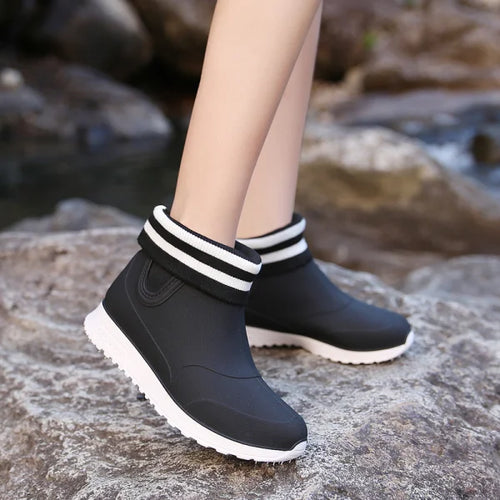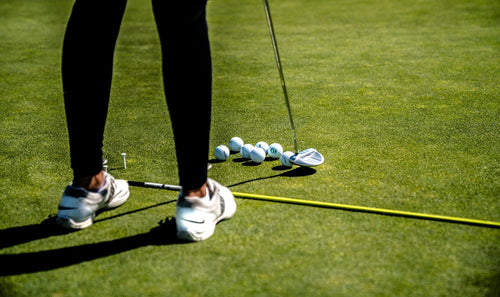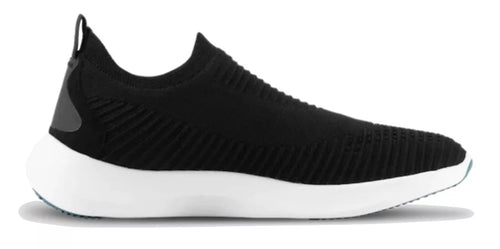“You can tell a lot about a person by the shoes that they wear.” This old proverb is like a divine word to us shoe aficionados and, apparently, also the health professionals.
With the growing hype around functional waterproof breathable shoes, researchers have conclusively linked people’s general health to their footwear.
But you don’t need scientists and doctors to tell you what you already know. Think about it; how many times have you worn a stylish pair of shoes only to get painful blisters within a few hours?
Guess what? That’s not supposed to happen!.
On the contrary, your shoes should keep you comfortable for as long as you’re wearing them.
And it doesn’t just end at your feet. The modern shoe is not only supposed to cushion your soles but your spine as well.
Seems like a stretch? Well, keep reading, and you’ll change your mind.
Does Your Footwear Really Affect Your Health?
At this point, you must think we’re exaggerating. But the fact of the matter is, footwear really does influence your overall health.
Recent data foregrounds some very concerning statistics about the average person and their shoe fit. According to a study conducted in 2018, about 63%-72% of people are wearing the wrong shoe size. Chances are, you’re a part of this unlucky demographic.
But what does it even matter if you’re off by a size? Surely, it can’t do much damage, right? Wrong!
If you have an even remotely active lifestyle, you’re no stranger to painful blisters and unappealing corns on your feet. Don’t even get us started on the perpetual ankle and calf pain.
But it doesn’t just end there.
The Link Between Your Feet and the Rest of Your Body
According to the American College of Foot and Ankle Surgeons, your entire body is like a long chain, with each link (or bone) connected to the next.
Naturally, if one bone is damaged, it will initiate a chain reaction causing radiating pain throughout the rest of your body. This is how a mere foot injury can cause long-term leg, back, and neck problems.

Dr. James Ioli from Harvard Medical School verifies this analogy. He observes that long-term heel wearers are more vulnerable to muscle and joint deformities.
The most common of these is the permanent shortening of the Achilles tendon, the fibrous tissue that supports your ankle muscles. This stunts your calf muscles and restricts your strides.

But that’s not all. Alarmingly, ill-fitting shoes can also permanently damage the nerves in your feet. This condition, known as peripheral neuropathy, occurs when nerves are under constant pressure from tight or misshapen footwear.
Vocal experts have also suggested a link between bad shoes and your vocal cords. Apparently, wearing uncomfortable shoes leads to shallow, rapid breathing. This, in turn, causes permanent damage to your respiratory system and vocal cords.
As you can see, shoes affect more than just your feet; they affect your whole body.
Therefore, investing in a well-fitting pair of lightweight, flexible shoes means investing in your overall health.
The Biomechanics of Walking
The biomechanics of walking has been the focus of many health journals in recent years. Harvard Health Publishing has highlighted the long-term health adversities of wearing the wrong shoe by delving into the mechanics of walking.

It turns out, the default design of the modern shoe can passively impair your feet.
Harvard evolutionary biologist Daniel E.Lieberman observed that the curve of the toe spring meant to facilitate walking engages the wrong muscle group in your feet.
As a result, those ultra-springy shoes that you love can actually weaken your foot muscles.
On the other hand, flatter and lightweight, flexible shoes will help you engage the right muscle group and take the load off your toes.
Additionally, wrong shoes can worsen pre-existing health problems, such as arthritis or diabetes.
So, if you’ve got inexplicable back problems or perpetual pain in your legs, the problem might be with your shoes.
The Effects of Wearing Bad Shoes
Now that we’ve validated the direct link between footwear and health let’s take a look at some of the effects that bad shoes have on your body.

Chances are, you’ve probably experienced some of these symptoms at least once in your life.
Short-Term Effects
The direct consequences of wearing bad, ill-fitted shoes can manifest in a matter of hours yet take months to treat.
- Blisters: Blisters are the most typically symptomatic of ill-fitting shoes. These fluid-filled vesicles of dead skin are your skin’s immediate reaction to constant friction. Blisters are extremely painful and take weeks to heal, leaving behind permanent scars and discolored, damaged skin.
- Corns: Corns are callous-like bumps of hardened skin that can form on your toes or soles. These bumps are actually the skin that has died from constant abrasion and damage due to a constricting shoe. If left untreated, corns can cause some serious long-term impairment to the joints of your feet.

- Athlete’s foot: This fungal skin infection can make it extremely uncomfortable to walk. Poor ventilation and moist shoes increase the risk of athlete’s foot. Thankfully, this painful condition can be avoided by investing in waterproof, breathable shoes.
- Hammertoes: This painful deformity causes your toes to bend out of shape. Often, your toes have to adapt to the small space of a tight shoe. Eventually, they will just readjust and bend like a hammer.

- Bunions: Your bones and joints can react negatively to tight shoes. In this case, a bone-like bump forms at the base of the big toe, causing the toe to turn inwards.
- Ankle pain: Uncomfortable shoes cause you to adjust your walk. Oftentimes, you’ll end up walking in a way that is very unnatural for your bones. As a result, you’ll have extremely sore ankles.

Nail-Related Effects
- Ingrown toenails: This occurs when the sides of your toenails curve inwards and grow into the surrounding skin. Ingrown toenails are a result of shoes that are too tight, narrow, or flat for your feet. If you’re athletic, you’re extremely likely to develop ingrown toenails, especially if you have bad shoes.
- Nail fungus: Your toenails are purely made of keratin, and certain species of fungi feed off this keratin. If your toenails are already weak from ill-fitting shoes, then they are more susceptible to fungus. Nail fungus is extremely difficult to treat, and sometimes the damage can be permanent.
Long-Term Effects
If you’re constantly wearing the wrong shoes, you’re actually causing more harm to your body than you realize.
- Joint Pain: Constant pressure on the joints can lead to arthritis. Additionally, if your shoes don’t have adequate cushioning or other shock-absorbing mechanisms, your body has to compensate for it. If you develop pain in your knees, it’s probably because your knees are acting as shock absorbers instead of your shoes.
- Back Injuries: Your shoes support more than just your feet; they support your back too. If your shoes
- Nerve damage: Numbness or excessive tingling in your feet is symptomatic of serious nerve damage. Tight or narrow shoes can often lead to permanent nerve damage.
Honestly, the list is endless. If you’re experiencing any of these symptoms, try switching to lightweight, flexible, and breathable shoes, and see the difference for yourself.
Other Risks
According to the Bureau of Labor Statistics, 43% of work-related injuries in the private sector are actually sprains, strains, or falls.

The culprit? Uncomfortable and slippery shoes that could not withstand long, laborious work hours.
But it’s not just the private sector. Your entire lifestyle is heavily dependent on footwear. Whether you’re a professional athlete or an office worker, your shoes will greatly affect your overall productivity.
Experience Freshness with Every Step: Try Loom's Breathable Shoes Today!
How to Choose the Right Shoes?
Hopefully, by now, you’ve realized the importance of well-fitted shoes. But what exactly should you be looking for?
The sad fact is, too many people rely solely on the numerical shoe size instead of finding a shoe that actually fits them well.
While you should keep the number as a guide, don’t think of it as a strict rule. Shoe size is usually never standard across different brands. So, try to judge the fit of your shoe based on other factors.
- First of all, the shoe should be breathable and waterproof to maintain hygiene. This will help you avoid problems such as fungal infections.
- Additionally, you should opt for lightweight, flexible shoes. This way, you’ll be taking the load off your toes and ankles by being able to move your feet around freely.
- Finally, go for shoes that aren’t too narrow in the front, even if it means you’ll have to size up.
Understandably, it’s difficult to find each and every one of these qualities in any one shoe. Luckily, Loom Footwear checks all the boxes!

Loom shoes are notorious for being 100% waterproof and well-ventilated. Additionally, this lightweight, flexible footwear is perfect for almost any activity.
Lightweight Flexible Shoes Are Better For Your Health
In recent years, the running community has created a huge buzz around lightweight, flexible shoes. However, the benefits don’t just apply to runners.
It turns out, lightweight flexible shoes are generally better for your health. Irrespective of your activity level, taking the extra load off your feet will help you in the long-run.
The most obvious reason for this is that once you shed off that extra weight, your muscles, joints and bones no longer have to work extra hard. This sets off a domino effect where the rest of your body also relieves itself from the added weight.
In fact, every pound of reduction in footwear weight is rewarded with a five percent less energy expenditure.
This means that your muscles, joints, and bones will gradually recover from the years’ worth of accumulated stress.
Conclusion
By now, you’ve hopefully realized that blisters and corns are the least of your worries if you have bad shoes.
The truth is, bad shoes can affect anything from your skin and joints to your muscular and nervous system.
So, while you’re holding on to your beloved old shoes to the detriment of your health, ask yourself this: is it really worth it?
Experience Freshness with Every Step: Try Loom's Breathable Shoes Today!
You may also like: Best shoes for hair dresser with foot problems


























